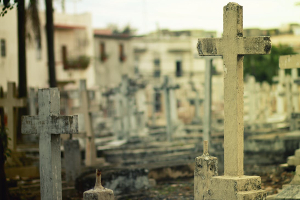 The first two days of November are significant times for some Christians as All Saints’ Day and All Souls’ Day are observed on the 1st and 2nd, respectively.After the fun-filled trick-or-treating and costume parties bursting with sweets, it is time to pray for and pay respects to saints and loved ones that have passed on. In Western Christian belief, the two are part of the triduum of Allhallowtide that lasts from 31st October to 2nd November, starting with All Hallows’ Eve.
The first two days of November are significant times for some Christians as All Saints’ Day and All Souls’ Day are observed on the 1st and 2nd, respectively.After the fun-filled trick-or-treating and costume parties bursting with sweets, it is time to pray for and pay respects to saints and loved ones that have passed on. In Western Christian belief, the two are part of the triduum of Allhallowtide that lasts from 31st October to 2nd November, starting with All Hallows’ Eve.
The celebrations of the two come from the belief that there is a spiritual bond between those who are in heaven and the living here on earth. It is usually a national holiday in Catholic countries and is not a bank holiday in the UK.
All Saints’ Day and All Souls’ Day Origins
- All Saints’ Day
Also known as All Hallows’ Day, Hallowmas,and Feast of All Saints, All Saints’ Day is dedicated to saints and martyrs by Roman Catholics and Anglicans. However, Evangelical Protestants don’t limit the people they honour to saints. They can be Christians who may not have become saints but left a good legacy. They can even be family and friends that passed down the faith in God for generations.
Its origins are traced back to the 4th century, which was formalised by Pope Boniface IV. It was decreed to celebrate on 13th May known as Feast of All Holy Martyrs. It became a holiday and was recognised by Pope Gregory IV in 837 AD, and extended the festival to include saints.The day of the celebrations was moved to 1st. Some sources claim that it began as a Celtic festival of the dead. Others say it came from the Feast of the Lemures.
- All Souls’ Day
Christians remember all souls or the faithful departed onAll Souls’ Day. The “faithful” in Catholic belief refers to baptised Catholics. People typically go to cemeteries to pray for the penitent of souls in Purgatory. Some Christians consider this day as an optional celebration or simply an extension of the observance of All Saints’ Day. Beliefs and customsrelated with All Souls’ Day vary extensively among Christian churches and denominations.
Even before Christianity, there were already a lot of festivals for the dead. All Soul’s Day was first formally established in 993 CE in a monastery in Cluny. During the 10th century, Saint Odilo proposed to have the day for the dead, especially the souls in purgatory, the day after All Saints’ day. Historically, poor Christians offered prayers for the departed in exchange for money or food from rich people.
 English
English 中文
中文
